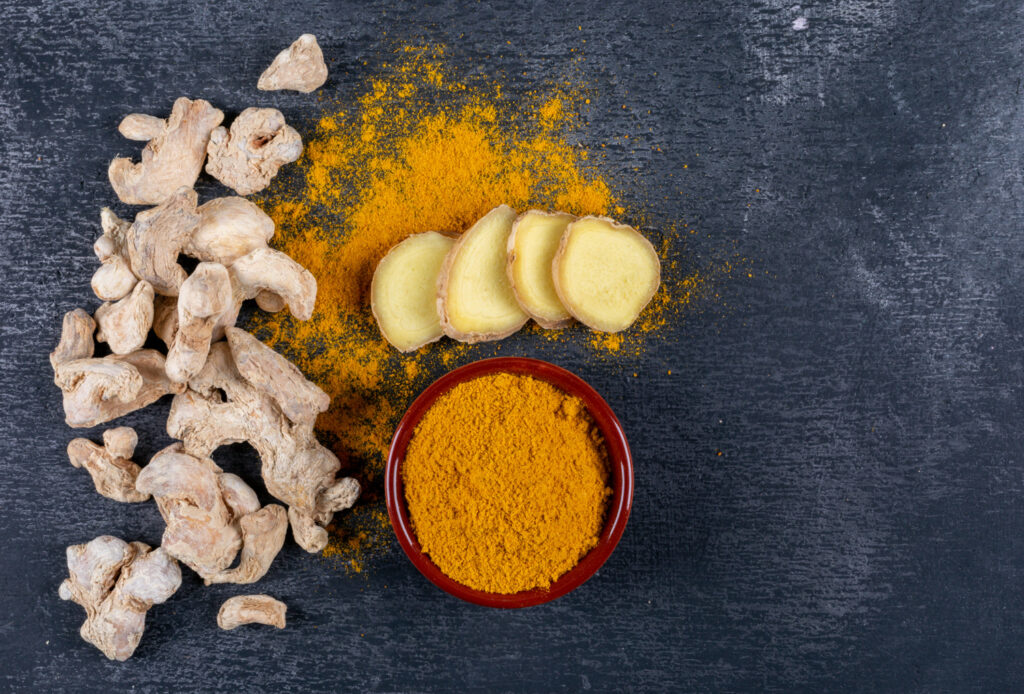
In this article
overview
Imagine having two powerful allies in your kitchen that not only spice up your meals but also offer a plethora of health benefits. Turmeric and ginger, both revered in traditional medicine for centuries, are such allies. Originating from the Zingiberaceae family, these spices have been staples in Indian and Chinese medicine. But can they be taken together? Let’s dive into the potential benefits and risks of combining these potent spices.
The Power of Turmeric
Anti-Inflammatory Champion
Turmeric is widely celebrated for its anti-inflammatory properties, primarily due to a compound called curcumin. Research indicates that curcumin can help manage various inflammatory conditions, including metabolic syndrome, arthritis, and hyperlipidemia.
- Inflammatory Bowel Disease (IBD): Curcumin has been shown to reduce inflammation in ulcerative colitis and Crohn’s disease, the two main types of IBD.
- Common Cold: A study highlighted that curcumin supplements can shorten the duration of the common cold.
- Arthritis: Multiple studies have demonstrated that turmeric can alleviate pain and inflammation in various types of arthritis.
- Metabolic Syndrome: Curcumin supports healthy blood lipids, blood sugar, and blood pressure levels, crucial factors in metabolic health.
However, the benefits of curcumin can be challenging to harness due to its poor bioavailability.
The Benefits of Ginger
Digestive and Pain Relief
Ginger is a go-to remedy for nausea and pain, thanks to its over 100 active compounds like gingerols and shogaols.
- Pregnancy-Related Nausea: Ginger is effective in reducing mild nausea and vomiting during pregnancy.
- Pain Relief: Ginger’s antioxidant properties help relieve pain in conditions such as menstrual cramps, muscle soreness, osteoarthritis, and migraines.
- Type 2 Diabetes: Ginger supplementation has shown improvements in fasting blood sugar and hemoglobin A1C levels.
- Seasonal Allergies: Ginger can improve the quality of life and alleviate nasal symptoms in those with allergic rhinitis.
While ginger is popular for motion sickness, studies offer mixed results on its efficacy for this condition.
Synergistic Effects: Turmeric and Ginger Together
Combining turmeric and ginger might amplify their health benefits. Some studies suggest that together, these spices can enhance anti-inflammatory and antioxidant effects.
- Joint Health: A study found that a supplement combining turmeric extract, ginger, and black pepper was as effective as Naproxen, an NSAID, in reducing inflammation in knee osteoarthritis patients.
- Enhanced Absorption: Black pepper improves the bioavailability of curcumin, potentially increasing turmeric’s effectiveness in the supplement.
Animal and cell studies also indicate a synergistic effect in fighting inflammation, though human studies are needed to confirm these benefits.
How to Take Turmeric and Ginger
You can easily find supplements that combine turmeric and ginger, often marketed for joint health or inflammation reduction. These supplements are typically available in capsule or pill form.
- Dosage: Turmeric supplements range from 500 to 8,000 mg per day, while ginger is typically taken in doses of 0.5 to 3 grams per day. It’s best to consult with a healthcare provider for personalized dosing recommendations.
- Enhanced Absorption: Look for supplements that include piperine (from black pepper) to improve curcumin absorption.
Safety and Potential Risks
Turmeric and ginger are generally safe for healthy adults, but high doses can pose risks. Pregnant or breastfeeding women should avoid high doses of turmeric due to a lack of research on its safety.
Potential Drug Interactions
Both spices can affect blood clotting, blood sugar, and blood pressure. Consult with a healthcare provider if you are taking anticoagulants, anti-diabetes medications, or blood pressure medications before starting these supplements.
Can You Overdose on Turmeric and Ginger?
There are no established upper limits for turmeric and ginger. The European Food Safety Authority (EFSA) suggests a safe curcumin intake of 0-3 mg per kilogram of body weight. For ginger, up to 4 grams per day is considered safe by the FDA, but higher doses may cause side effects like arrhythmia and digestive issues.
Side Effects
Common side effects of high doses of turmeric and ginger include:
- Abdominal discomfort
- Heartburn
- Diarrhea
- Mouth and throat irritation
- Headache
- Rash
- Yellow stool
Conclusion: Spice Up Your Health Wisely
Turmeric and ginger are powerful allies in promoting health and fighting inflammation. While they offer numerous benefits, it’s essential to consume them in moderation and consult with a healthcare provider, especially if you have underlying health conditions or are taking medications. By combining these spices thoughtfully, you can harness their synergistic effects to boost your health naturally
A Quick Review
Turmeric and ginger, both from the Zingiberaceae family, have been staples in traditional medicine. Combining these spices may enhance their anti-inflammatory and antioxidant effects, offering potential benefits for conditions like arthritis and metabolic syndrome. However, they may interact with medications and have side effects at high doses. Consult with a healthcare provider before starting supplements
FAQS
Can turmeric and ginger be taken together?
Yes, combining turmeric and ginger can enhance their anti-inflammatory and antioxidant effects, offering various health benefits.
What are the benefits of taking turmeric?
Turmeric, especially its active compound curcumin, helps manage inflammation, supports metabolic health, and may alleviate symptoms of arthritis and inflammatory bowel disease.
How does ginger benefit health?
Ginger is known for relieving nausea, pain, and symptoms of seasonal allergies. It also supports blood sugar control in type 2 diabetes.
How can I enhance the absorption of turmeric?
Combining turmeric with black pepper (which contains piperine) can significantly improve curcumin absorption in the body.












